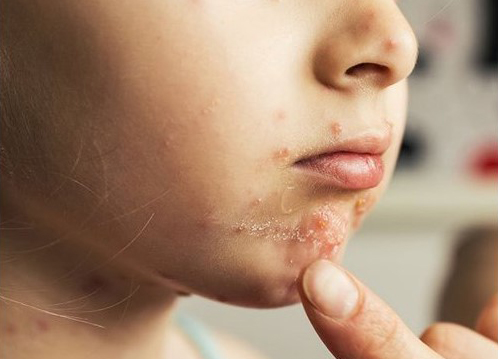Outbreak of contagious skin infection called Impetigo reported in Madeira Island, Portugal
Nikhil Prasad Fact checked by:Thailand Medical News Team Nov 12, 2024 5 months, 1 week, 19 hours, 52 minutes ago
Outbreak News: Health authorities in Portugal have confirmed an outbreak of a contagious skin infection called Impetigo in the Madeira Island.
 Outbreak of contagious skin infection called Impetigo reported in Madeira Island, Portugal
Outbreak of contagious skin infection called Impetigo reported in Madeira Island, Portugal
So far, 11 individuals have been found with the condition while many more suspected cases are being investigated.
https://madeira.rtp.pt/politica/madeira-enfrenta-um-surto-de-impetigo-video/
https://www.jm-madeira.pt/regiao/madeira-enfrenta-surto-de-impetigo-uma-infecao-da-pele-contagiosa-JC17049011
This is a developing news story and Thailand Medical News stringers covering the
Outbreak News segment will be providing more updates as official reports and details emerge from local health authorities.
What is Impetigo?
Impetigo is a highly contagious skin infection primarily affecting young children but can also occur in adults. This condition is caused by bacteria, mainly Staphylococcus aureus or Streptococcus pyogenes, which often enter the skin through minor cuts, bites, or even intact skin. Impetigo appears as reddish sores, commonly around the nose, mouth, and other exposed areas. These sores rupture quickly, oozing fluid and forming a characteristic honey-colored crust.
https://www.cdc.gov/group-a-strep/about/impetigo.html
Types of Impetigo
-Non-Bullous Impetigo: The most common form, characterized by small, red sores that develop a yellowish crust after rupturing. Swollen glands and mild itching accompany it, and it typically heals without scarring.
-Bullous Impetigo: This rare type mainly affects infants under two. It forms larger fluid-filled blisters on the torso, arms, and legs that lack surrounding redness. The blisters eventually break, leaving crusty sores.
-Ecthyma: The most severe type, this form penetrates deeper layers of skin, causing painful ulcers that may scar after healing.
Symptoms and Transmission
The infection's primary symptoms include red sores that evolve into crusted lesions. Itching is common, though pain is mild. Impetigo is highly contagious and spreads through direct skin contact, as well as shared items like towels, clothing, or bedding. Individuals, particularly children, should remain at home for at least 24–48 hours after beginning antibiotic treatment to prevent spreading the infection.
Diagnosis and Treatment
A healthcare provider can typically diagnose impetigo by exa
mining the sores. For large or persistent cases, skin culture may be taken to determine the most effective antibiotic. Treatment includes topical or oral antibiotics. Over-the-counter antibiotic creams may help for minor cases, but prescription medications are generally more effective, especially for extensive or severe infections.
Prevention and Outlook
Good hygiene is vital in preventing impetigo. Regular handwashing, keeping nails short, avoiding scratching, and cleaning minor cuts promptly can reduce the risk of infection. Most cases resolve quickly with treatment, although recurrence is possible. Without treatment, impetigo can persist for weeks, with a higher risk of complications.
Impetigo typically heals without lasting effects, but prompt treatment limits the risk of complications, which can include deeper skin infections or, in rare cases, kidney inflammation.
For the latest
Outbreak News, keep on logging to Thailand Medical News.
Read Also:
https://www.thailandmedical.news/news/rapid-spread-of-new-super-strain-bacteria-threatens-asia
https://www.thailandmedical.news/news/odisha-india-facing-a-severe-chickenpox-outbreak-possibly-caused-by-a-new-sub-lineage-of-the-clade-9-strain
https://www.thailandmedical.news/news/polio-continues-to-cripple-children-in-pakistan-as-48-wild-poliovirus-type-1-cases-reported-in-2024
https://www.thailandmedical.news/news/first-human-case-of-h5n1-bird-flu-detected-in-canada
